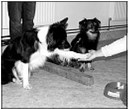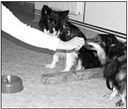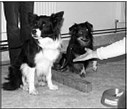

 “This series of photos from the National Academy of Sciences shows a dog being asked for its paw and obeying, left. In the second photo, the dog watches its partner in the experiment receive a food reward that it didn’t receive. In the third photo, the dog refuses to give its paw and avoids looking at the experimenter.” Source of caption and photos: online version of the Omaha World-Herald article quoted and cited below.
“This series of photos from the National Academy of Sciences shows a dog being asked for its paw and obeying, left. In the second photo, the dog watches its partner in the experiment receive a food reward that it didn’t receive. In the third photo, the dog refuses to give its paw and avoids looking at the experimenter.” Source of caption and photos: online version of the Omaha World-Herald article quoted and cited below.
(p. 2A) Ask them to do a trick, and they’ll give it a try. For a reward, they’ll happily keep at it.
But if one dog gets no reward and then sees another dog get a treat for doing the same trick, just try to get the first one to do it again.
Indeed, the animal may turn away and refuse to look at you.
Dogs, like people and monkeys, seem to have a sense of fairness.
. . .
In the experiments described in today’s edition of Proceedings of the National Academy of Sciences, Range and colleagues experimented with dogs that understood the command “paw” to place a paw in the hand of a researcher. It’s the same game as teaching a dog to “shake hands.”
. . .
The dogs sat side by side with an experimenter in front of them. In front of the experimenter was a divided food bowl with pieces of sausage on one side and brown bread on the other.
The dogs were asked to shake hands and could see what reward the other dog received.
When one dog got a reward and the other didn’t, the unrewarded animal stopped playing.
For the full story, see:
Associated Press. “It’s a Dog’s Life Only When Someone Else Gets Treat.” Omaha World-Herald (Tues., Dec. 9, 2008): 2A.
(Note: ellipses added.)

